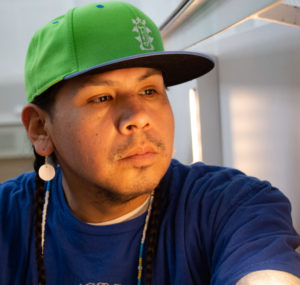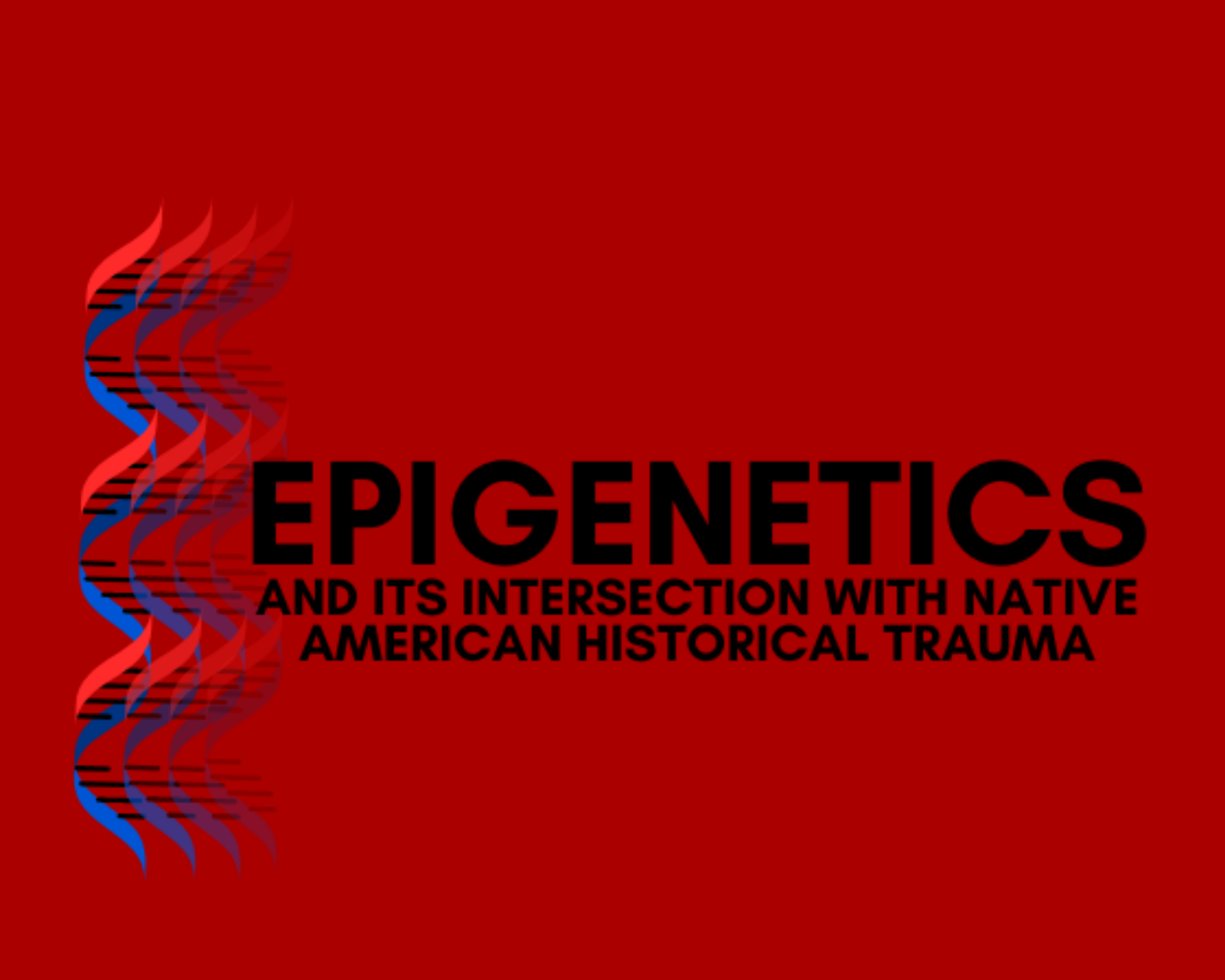Pulling out both his business card and his Indian Blood Certificate of Degree from his worn wallet, it is obvious to me that Joe D. Coulter holds two of his identities close to heart.
Coulter, a professor emeritus at the University of Iowa College of Public Health, is actively involved with human rights advocacy for Native Americans in Iowa and Montana. He is 1/16 Potawatomi.
I originally interviewed Dr. Coulter as part of my human rights coursework at the University of Iowa and was amazed at how much history affects the present day lives of Native Americans.
He has focused on many aspects of tribal life including children’s health, emergency preparedness, and improving biomedical research. He has also held many positions for the University of Iowa, the state of Iowa, and other national groups and commissions regarding diversity and inclusion.
A topic Coulter has been looking at frequently is epigenetics – the study of inherited traits that can affect gene expression, but not the physical genetic code.
Epigenetics: Under the Microscope
Epigenetics is the study of gene expression inherited by ancestors, but the physical DNA sequence remains unchanged. The term is often grouped with other theories such as historical trauma and transgenerational transmission of trauma.
Historical trauma, coined by Lakotan Maria Yellow Horse Brave Heart, is when trauma is transferred from the trauma victims to their descendents through biological, psychological, environmental, and social factors.
Transgenerational transmission of trauma (TTT) is similar, but the transmission is linked to chronic PTSD, where the trauma is repetitive and prolonged. Although a fairly new theory, TTT has been recognized in descendents of Holocaust survivors and Black Americans.
These traumas change the expression of the genes overtime by leaving methylation, which suppresses gene transcription.
“[Methylation] becomes a sort of “memory” of the cell and since all cells in our body carry this kind of memory, it becomes a constant physical reminder of past events, our own and those of our parents, grandparents and beyond,” Dr. Natan P.F. Kellermann, a clinical psychologist working with Holocaust survivors in Israel stated in a study on epigenetics.
Through the process of methylation, what was once an emotional pain is now a physical pain. Having the trauma stored in the DNA allows the trauma to be passed down to children.
What U.S. History Classes Skipped Over
History classes in the United States barely touch on the suffering Native Americans have gone through since the arrival of Christopher Columbus in 1492. Even in my elementary school, the teacher told us to make Native headdresses out of construction paper while we ate our school Thanksgiving meal of cornbread and mashed potatoes with gravy.
Native children were forced to go to boarding schools until the mid-1900s to assimilate into American culture. They were stripped of their hair, clothes, language, culture, and sense of self – not to mention the genocide, forced removals, and racism.
Through the lens of epigenetics, the traumas endured by the Native American population for the past 500 years have shaped the way they live.
A Dive into Destitute Health
When compared to the rest of Americans, Native Americans have a lower health status, lower life expectancy and higher risk of disease, according to the Indian Health Service, the federal health program for Native Americans.
Among endemic emotional trauma and physical health ailments, Native Americans also experience a high rate of substance use, according to the National Institute on Drug Abuse. Those struggles may coalesce together, becoming the explanation for Native American’s position as the highest suicide rate in the United States compared to any racial or ethnic group, according to the the Center for Disease Control and Prevention (CDC).
In a 2019 study done by the CDC, suicide rates from 1999 and 2017 were compared. Native American female suicide rates rose 139 percent while Native American male suicide rates rose 71 percent.
In Iowa, the overall suicide rate is seems to be growing at the same rate as the United States’, according to America’s Health Rankings. There is no published data concerning Native American suicide rates in Iowa.
However with Meskwaki being the only federally recognized tribe in Iowa, and the fact they have their own local medical center, the Meskwaki tribe is more fortunate than many other Native settlements in regards to medical access.
Large health disparities usually call for increased medical assistance, but for the Native community, assistance is hard to come by. The Indian Health Service (IHS) exists for the sole purpose of helping Native Americans, but it is underfunded by the U.S. government.
In 2013, the funds given per capita to patients was $2,849, while the national health care per person was $7,717, according to a report from the National Congress of American Indians. IHS covers 2.6 million Native Americans.
Based on this data, IHS is receiving $5,000 less dollars than the American healthcare system to help a group of people with the largest health disparities of any American group.
Sufferance on Iowan Soil

Dawson Davenport, a graduate from the University of Iowa with a degree in art and entrepreneurial management, is a Meskwaki Native, artist, writer, and activist, as well as a member of his tribal council. He was very aware of the health disparities his people face across the country – mostly focusing on diabetes and cancer.
Although the Meskwaki nation has their own health services, Davenport said not many tribes are as lucky and even growing up with the services were sparse, because IHS decided what issues would be focused on. He said he is lucky his community has their own medical center.
“We are able to take back our own healthcare and issues, and customize what our people need, rather than what is told is important,” Davenport said.
The studies on Native health disparities are corroborated by Davenport’s personal experiences. He said that the numbers of people afflicted by illness that he has met have jumped dramatically.
Political relationships and old mentalities have a part in the increase of health disparities, Davenport said, but also believes it is related to the effects of what his grandparents went through. He said his generation may not have experienced it themselves, but seeing and hearing stories makes them sad and hurts their spirit.
The relationships and mentalities Davenport is referring to are the decisions the American government has made (for example, the Indian Removal Act) and is still making (see the Dakota Access Pipeline).
“It really does have an effect on our health, and it makes us [question] ‘What there is to live for,” Davenport said. “Why be healthy if no one cares about us—if the world seems to be against us? When they tried to annihilate us from the earth, what is there to live for?”
That has a lasting effect.
Is Epigenetics a Legitimate Argument?
Davenport is optimistic that things will get better. He said a lot of Natives are going back to their cultural roots: food. Many are starting food sovereignty initiatives, including Dr. Joe Coulter, to combat the American healthcare system.
Food sovereignty is the idea that people should have access to healthy and cultural-appropriate food that the people grow themselves. The Meskwaki’s Red Earth Garden is an initiative for the tribe go back to their ancestors’ ideas of sustainability.
Although the theory of epigenetics and historical trauma causing health problems is new and disputed, Coulter believes it is well-founded.
“There seem to be credible sources that make a convincing statement [as to] how your environment and experiences can affect your health, and [are] also passed down to your grandchildren, even in the absence of the stimulus that produced it,” Coulter said. “When you go through [all the things Native people have been through] for many generations, it’s hard to imagine that there hasn’t been an accumulative effect on people’s health.”

